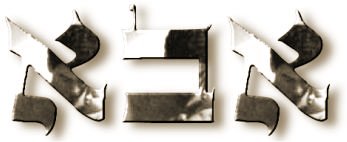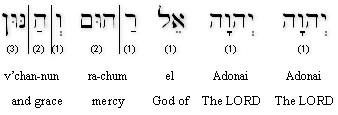|
|
 |
 |
|
The LORD, the LORD, God of mercy and grace...
Exodus 34:6a
|
 |
 |
|
In the Hebrew Scriptures, YHVH is the personal name of God and his most frequent designation. Because it is composed from the four Hebrew letters Yod, Hey, Vav, and Hey, it is sometimes referred to as the "Tetragrammaton," which simply means "the four letters." It is often translated as "the LORD" (all caps) in English translations.
|
|
|
 |
 |
|
There is some controversy about how the name YHVH should be pronounced. Since ancient Hebrew did not use vowel markings, the historical pronunciation of the sacred Name is simply not known. To avoid violating the Third Commandment ("Thou shalt not take the name of the LORD thy God in vain"), Jewish tradition sidesteps the issue by substituting the (Biblical) word Adonai ("my Lord") in its place.
There are clues in the texts of Scripture about the meaning of the Name. When God commissioned Moses to be Israel's liberator from the bondage of Pharaoh's Egypt, he asked for God's Name in order to validate his God-given role to the children of Israel (see Exodus 3:13-14). God simply answered Moses, "ehyeh-asher-ehyeh."
|
 |
 |
|
The phrase ehyeh asher ehyeh (translated "I am who I am" in the KJV) derives from the Qal imperfect first person form of the verb havah: "I will be," and therefore indicates a connection between the Name YHVH and being itself. YHVH is the Source of all being and has being inherent in Himself (i.e., He is necessary Being). Everything else is contingent being that derives existence from Him. The name YHVH also bespeaks the utter transcendence of God. In Himself, God is beyond all "predications" or attributes of language: He is the Source and Foundation of all possibility of utterance and thus is beyond all definite descriptions.
|
 |
 |
|
Nonetheless, there are some people who seem fascinated with the phonetics of the Sacred Name and offer to "restore it" to those of us willing to be initiated into their secret knowledge. These "Sacred Name" enthusiasts, as they are sometimes called, often allege that the term "Adonai" (despite being a Biblical title of the LORD (Gen. 15:2, Ex. 34:23, Deut. 10:17, Psalm 8:1, etc.), should not be used for YHVH, but instead offer their own perferred pronunciation, often derived from dubious methods of "permutation" based on Kabbalistic speculations. (The 1998 Darren Aronofsky movie "Pi" is based on such speculations.)
|
|
|
 |
 |
|
The search for the "perfect" conjuration of the Sacred Name is a form of occultism, symptomatic of people who elevate spiritual technique and "abracadabra" above the shared meaning of the "Presence of God." Moreover, such conjuration is a sign of unbelief, since once you understand the meaning of the Name, the words you use to express it are incidental. Perhaps this explains why there is such an abundance of Names and Titles of God given in the Scriptures (there are literally HUNDREDS, many of which reveal profound truth about the LORD and His ways). Like poets, the sacred writers sought for various words to express the Reality that the words pointed to. But once you get a hold of the Reality (or rather, the Reality gets a hold of you), the words you use to express your awe will always seem limited and inadequate.
|
 |
|
|
 |
 |
 |
|
For the last word on this subject we look to Jesus Himself, who taught us that the Name of God is best understood as "Father." In fact, Jesus used the common Aramaic word for "daddy" (abba) to refer to His relationship with God, and He wanted his disciples to do likewise.
We do not need gnostic awareness or ethereal speculations to help us understand the Name of God. He relates to us intimately as a good earthly father relates to his children. We do not need incantations or "shibboleths" to access God, since we trust in the plain invitation of our Father to come to Him through the gracious sacrifice of His Son on behalf of our alienation. We do not trust in emanations of spiritual forces hidden in Hebrew letters, since we can know the "Word that is behind the word" in the life and love of Jesus our Savior.
It is well and good to understand the meaning of the hundreds of Names and Titles of God as revealed in the Scriptures, of course, but in the end we need to trust in Him as a small child trusts in the love of His daddy. If we are truly trusting in Him, Jesus told us God would never neglect the cry from our heart: "Abba!"
|
|







